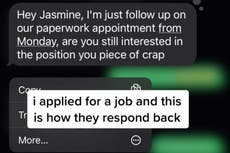Millennial sparks confusion recalling ‘casual Fridays’ practice in pre-pandemic offices
‘Was this a thing?!’

A man on TikTok shocked the internet when he informed viewers of an old corporate office practice, and many are wondering why it even existed.
A TikToker named Jordan (@jordanreviewsit) posted a video on Tuesday about being “allowed to wear jeans on Friday,” but only if he paid the human resources team $10 each week.
He captioned the TikTok: “Pre-pandemmy office culture was wild”.
The video gained more than 165k views from users, many of whom were stunned that offices used to ask their employees to pay for wearing jeans to work.
“Whaaaaat? Was this a thing?!” asked one TikToker.
“WHAT?!” wrote another shocked user.
Others shared their experiences with casual Fridays as well. The practice, which gained popularity throughout offices in the 1990s, allowed employees to wear “business casual” clothing on Fridays as a signal to the start of the weekend. Now, it has decreased significantly as a number of Americans prefer remote working or hybrid office schedules. In February 2022, 39 per cent of Americans worked entirely from home while 42 per cent had a hybrid schedule, according to Gallup.
One person explained how their office collected casual Friday fees and donated them to a charity. “You would buy a pass for a month that went over your badge. It changed colors every month,” they said.
Another user wrote that their office would hand out stickers when they paid that shows they can wear jeans. “I did it the 1st week, then kept the sticker,” they added. “It’s been 3 years”.
One user wrote, “I didn’t pay and just wore it anyway,” to which Jordan replied: “This is the way”.
Since the start of the Covid-19 pandemic, workplace culture has adapted to more flexible ways of working. Several companies, including Airbnb and Amazon, now allow their employees to work remotely indefinitely. Meanwhile, Gen Z employees expect “more personalisation in how they want to be treated by their employer,” according to a recent study by Deloitte.
Join our commenting forum
Join thought-provoking conversations, follow other Independent readers and see their replies
Comments


Bookmark popover
Removed from bookmarks